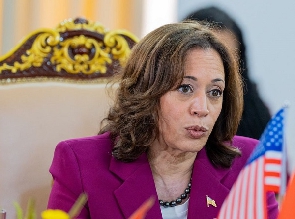 US Vice President, Kamala Harris
US Vice President, Kamala Harris
In recent years, Africa has expressed mistrust towards the United States of America, and this mistrust continues to be evident in the aftermath of Vice President Kamala Harris’ recent visit to the continent.
There are several reasons for this ongoing mistrust between Africa and the United States. One of the primary issues is the history of the relationship between the two regions. The United States has long been viewed as a colonial power that came to Africa and forcibly took resources and build structures, without much regard or compensation for the impact it had on the continent's people. Additionally, the United States has frequently inserted itself into African affairs, often leading to resentment among African leaders and citizens alike.
Moreover, the USA has been accused of neocolonialism in the past, further emphasizing the view that the United States does not have Africa's best interest at heart. Many parts of the continent are rich in resources that are essential to the global economic system, and at times, African countries believe that the United States has been taking advantage of that wealth without necessarily benefiting Africa.
Another major issue of concern arises from the fact that the United States tends to impose its own cultural and social values on African countries without considering local contexts. For instance, programs such as the President's Emergency Plan for AIDS Relief (PEPFAR) aimed to fight HIV/AIDS in Africa, but have not always been implemented effectively, leading to accusations of neo-imperialism. Similarly, the United States is widely viewed in Africa as not doing enough to support local businesses and entrepreneurs and favoring multinational corporations.
Additionally, President Donald Trump’s derogatory language towards Africa, such as referring to African countries as “shithole countries,” further strained the relationship between the continent and the United States. African leaders and citizens regarded such comments as hypocritical and unwarranted, resulting in speculation about whether the United States is genuinely interested in African development, or only in extracting resources.
With the recent visit by Vice President Kamala Harris, there were high expectations that this relationship could be improved. While Harris did hold talks with African leaders on a range of issues, including health, and economic and security cooperation, the visit lacked substance. Many Africans believed that the United States should have done more to listen and learn from Africa's perspective.
Africans believe that the United States needs to take the initiative to build trust with Africa. This begins by acknowledging and respecting African culture and values, while respecting and protecting Africa's resources. The United States should seize every opportunity to treat African countries as partners in Africa’s development, rather than merely clients, as detailed under various development models. The USA can work with African countries, using its abilities and resources, to develop Africa's economies autonomously and create initiatives that can help foster development within the continent.
Development initiatives should focus less on aid and more on entrepreneurial, innovative, and creative approaches to Africa's economic transformation. The USA can also assist African entrepreneurs to establish connections with counterparts in the United States, so that they can benefit from multinational business models. Finally, the United States needs to encourage African governance systems that are accountable and transparent and that support the local communities’ social and economic empowerment.
In conclusion, sustainable collaboration between Africa and the United States requires sustained mutual efforts. It is essential to understand and respect African viewpoints and work towards taking action that can benefit both Africa and the United States. The relationship ought to be based on mutual respect, rather than mutual suspicion. The Vice President's visit was an excellent opportunity to build momentum in strengthening the relationship, and this must build up towards a long-lasting and mutually beneficial partnership between the regions.